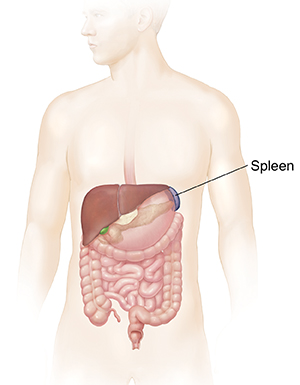Understanding a Bruised Spleen
Understanding a Bruised Spleen
A bruise (contusion) is a type of injury. It occurs when small blood vessels break open and leak blood into nearby tissues. The spleen is a small organ located in the upper left part of the belly (abdomen). It sits under the left ribs in front of the stomach. It can become bruised after an injury to the area.
What causes a bruised spleen?
The spleen can become bruised from:
Car accidents
Direct blows to the belly. This may happen while playing a sport or while in a physical fight.
Falls that injure the belly
Symptoms of a bruised spleen
You may feel pain and soreness in the upper left part of your belly. You may also feel pain in the left side of your chest, under your left ribs, or in your left shoulder. In some cases, you may have bruised skin over the injured area.
Treatment of a bruised spleen
Treatment for a bruised spleen depends on how severe the injury is. Some cases may be managed without surgery. But you may still need:
Close monitoring in the hospital
Bed rest and IV (intravenous) fluids
Tests to check for blood loss and other injuries
For a minor bruise
If the bruise is minor with no signs of blood loss, you may be discharged from the hospital after several days. Home care may involve further rest. You may also need to stop some activities until your spleen heals. You may also need follow-up care with your healthcare provider.
For a severe case
In severe cases, or if tests show blood loss or other injuries, you will likely need a procedure or surgery. These may be used to:
Drain excess fluids or blood from the abdomen
Find and stop the source of bleeding in the spleen or abdomen
Remove the spleen and repair other injuries as needed
Possible complications of a bruised spleen
These can include:
Severe blood loss, which can lead to shock
Burst (ruptured) spleen
Infection
Death
Call 911
Call 911 right away if you have signs of shock. These include:
Pale skin
Rapid pulse
Shallow breathing
Dizziness
Fainting
Confusion
When to call your healthcare provider
Call your healthcare provider right away if you have any of these:
Fever of 100.4°F (38°C) or higher, or as directed by your provider
Symptoms that don’t get better with treatment, or get worse
New symptoms
Updated:
September 04, 2017
Sources:
Dondelinger RF. Management of Trauma to the Liver and Spleen. In: Mauro MA, et al, editors. Image-Guided Interventions. 2 ed. Philadelphia: Saunders; 2014. p. 491-502., Maung AA, Kalan LJ. Management of splenic injury in the adult trauma patient. Up To Date. October 5 ed: Up To Date; 2015. p. 19., Maung AA, Kalan LJ. Surgical management of splenic injury in the adult trauma patient. Up To Date. February 2 ed: Up To Date; 2016. p. 18., Schrier SL. Approach to the adult patient with splenomegaly and other splenic disorders. Up To Date. February 25 ed: Up To Date; 2016. p. 54.
Reviewed By:
Images Reviewed by Staywell medical art team.,Lehrer, Jennifer K, MD,Ziegler, Olivia, MS, PA
